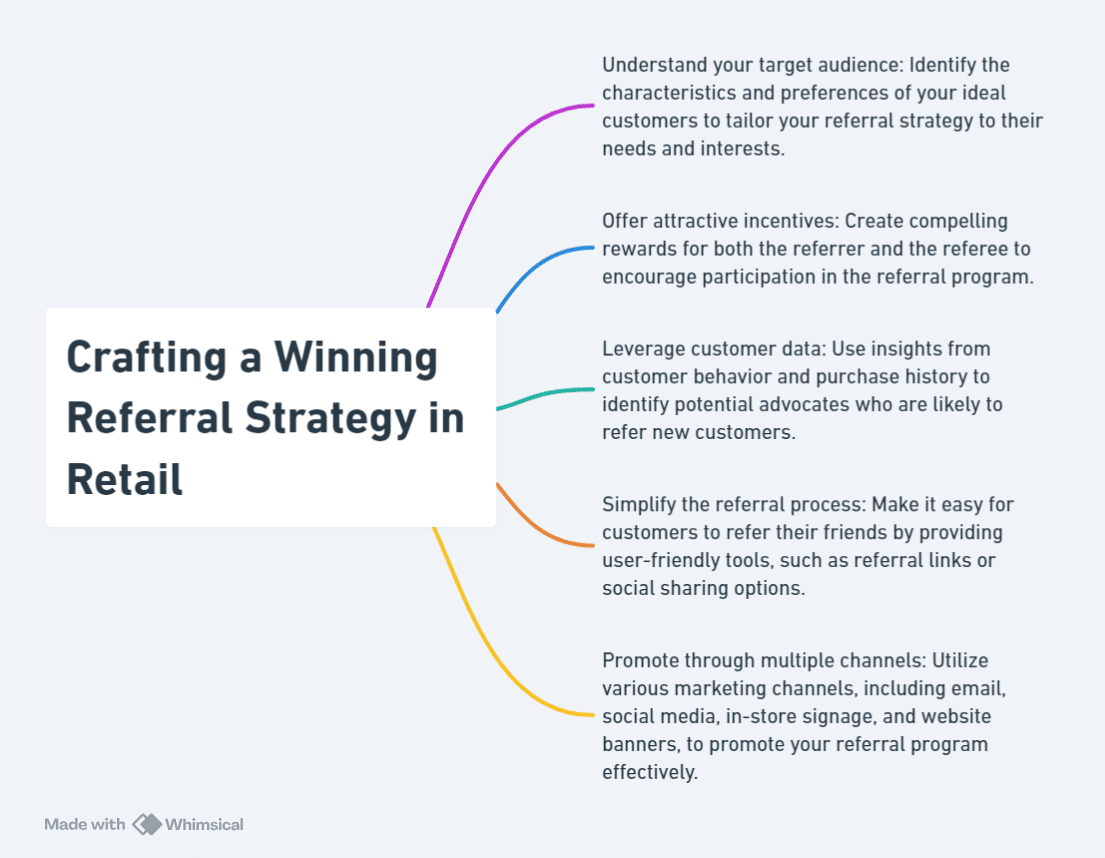In the competitive world of retail, customer acquisition and retention are paramount. Referral marketing has emerged as a powerful tool for retailers to tap into the trust and loyalty of their existing customers, driving new business and fostering long-term relationships. This article delves into the advantages, essential tools, and latest trends in retail referral marketing, empowering retailers to craft a winning strategy that generates tangible results.
Crafting a Winning Referral Strategy in Retail

In the competitive landscape of the retail industry, building a strong customer base and enhancing brand loyalty are paramount. One of the most effective strategies to achieve these goals is through retail referral marketing. This approach not only drives sales but also fortifies customer relationships. In this article, we delve into how businesses can craft a winning referral strategy in the realm of retail referral marketing.
1. Understanding Retail Referral Marketing
Retail referral marketing is a technique where retailers encourage their existing customers to recommend their products or services to their friends and family. This word-of-mouth strategy is powerful, as recommendations from trusted sources often hold more weight than traditional advertising. In retail referral marketing, incentives are usually offered to both the referrer and the referee, making it a win-win situation for all parties involved.
2. Establishing a Referral Program
2.1. Setting Clear Objectives
Before launching a referral program, it’s crucial to define clear objectives. Whether it’s increasing brand awareness, boosting sales, or expanding your customer base, having specific goals will help tailor your retail referral marketing strategy effectively.
2.2. Creating Attractive Incentives
The success of your retail referral marketing program largely depends on the attractiveness of the incentives you offer. These could range from discounts, loyalty points, exclusive access to new products, or even cash rewards. The key is to understand your audience and offer incentives that resonate with them.
3. Leveraging Technology
In today’s digital age, utilizing technology is a must for amplifying your retail referral marketing efforts. Implementing a user-friendly referral system through your website or mobile app can streamline the process for your customers, making it easier for them to share your brand with others.
4. Promoting Your Referral Program
4.1. Through Multiple Channels
Promote your retail referral marketing program across various channels to maximize reach. This can include email marketing, social media, in-store signage, and your website. Consistent messaging across these platforms will reinforce the program’s visibility.
4.2. Training Your Staff
Ensure that your staff is well-versed in the nuances of your referral program. They should be equipped to explain the benefits and mechanics to customers, further driving participation in your retail referral marketing initiative.
5. Measuring Success
To gauge the effectiveness of your retail referral marketing program, track key metrics such as participation rates, conversion rates, and the overall impact on sales and customer loyalty. This data will provide valuable insights, enabling you to refine and enhance your strategy over time.
Maximizing Growth: Top Referral Marketing Websites in 2024
The Advantages of Referral Programs for Retailers

Retail referral marketing offers numerous advantages for retailers, making it a powerful tool for driving customer acquisition, reducing marketing costs, and fostering customer loyalty.
- Increased Customer Acquisition: Retail referral marketing leverages the trust and credibility of existing customers to attract new ones. Referrals from satisfied customers have a higher conversion rate than traditional marketing channels, as potential customers are more likely to trust recommendations from people they know and respect.
- Reduced Marketing Costs: Retail referral marketing is a cost-effective way to reach new customers. Unlike paid advertising, which requires significant financial investment, referral programs rely on word-of-mouth marketing, which is essentially free. By incentivizing customers to refer their friends and family, retailers can tap into a vast network of potential customers without breaking the bank.
- Improved Customer Loyalty: When customers feel valued and rewarded for referring new business, they are more likely to remain loyal to the brand. Retail referral marketing programs that offer attractive incentives and personalized experiences can foster a sense of community and encourage customers to become brand advocates.
- Enhanced Brand Reputation: Positive referrals from satisfied customers build trust and credibility, enhancing the retailer’s reputation in the market. When customers share their positive experiences with others, it creates a ripple effect that can attract new customers and strengthen the brand’s overall image.
- Targeted Marketing: Retail referral marketing allows retailers to target specific customer segments, ensuring that their marketing efforts are reaching the right audience. By tailoring referral incentives to specific customer demographics or interests, retailers can increase the relevance and effectiveness of their referral campaigns.
In conclusion, retail referral marketing offers numerous advantages for retailers, including increased customer acquisition, reduced marketing costs, improved customer loyalty, enhanced brand reputation, and targeted marketing. By embracing the power of word-of-mouth marketing and leveraging the trust and credibility of their existing customers, retailers can unlock a sustainable source of growth and build a competitive advantage in the ever-evolving retail landscape.
The Ultimate Referral Marketing Plan: A Step-by-Step Guide
Essential Tools for Retail Referral Marketing Success

In the realm of retail referral marketing, leveraging the right tools can significantly enhance the effectiveness of your campaigns. These tools not only streamline the process of referral marketing but also provide insightful data to help refine your strategies. Here, we explore the essential tools that can propel your retail referral marketing efforts toward success.
1. Referral Program Software
1.1. Automated Referral Tracking
A robust referral program software is indispensable for tracking the activities within your retail referral marketing campaigns. Such software automates the tracking of referrals, sign-ups, and reward distributions, ensuring accuracy and efficiency.
1.2. Integration Capabilities
The best referral program software integrates seamlessly with your existing CRM and marketing platforms. This integration allows for a unified approach to managing your customer data and referral insights, crucial for personalized marketing strategies.
2. Customer Relationship Management (CRM) Systems
2.1. Centralized Customer Data
A CRM system is vital for storing and organizing customer information. In the context of retail referral marketing, a CRM helps you understand customer behavior, segment your audience, and tailor your referral programs to meet specific customer preferences.
2.2. Personalization and Segmentation
By leveraging CRM data, retailers can create personalized referral marketing campaigns that resonate with different segments of their customer base, increasing the likelihood of successful referrals.
3. Communication Tools
3.1. Email Marketing Platforms
Email remains a powerful tool for retail referral marketing. Email marketing platforms enable you to craft targeted and personalized referral invitations, follow-ups, and reward notifications, directly engaging with your customers.
3.2. Social Media Management Tools
These tools are essential for promoting your referral program on social media, allowing you to schedule posts, track engagement, and respond to queries or mentions related to your retail referral marketing efforts.
4. Analytics and Reporting Tools
4.1. Performance Tracking
Understanding the performance of your referral program is crucial. Analytics and reporting tools provide detailed insights into various metrics such as referral rates, conversion rates, and overall ROI from your retail referral marketing campaigns.
4.2. Data-Driven Decisions
With the right data, retailers can make informed decisions to optimize their referral programs, tailor their marketing messages, and improve the overall customer experience.
5. Reward Management Systems
5.1. Automated Reward Distribution
To maintain enthusiasm and participation in your referral program, it’s essential to have an automated system for distributing rewards. Such systems ensure timely and accurate reward delivery, enhancing customer satisfaction.
5.2. Customizable Reward Options
Flexibility in reward options caters to diverse customer preferences, making your retail referral marketing program more appealing to a broader audience.
Boost Your Sales: Top Real Estate Referral Marketing Ideas
Latest Trends in Retail Referral Marketing

Retail referral marketing is continuously evolving, influenced by technological advancements, changing consumer behaviors, and market dynamics. Staying abreast of the latest trends is crucial for retailers to design effective referral programs that resonate with their audience. This section delves into the most recent trends shaping retail referral marketing.
1. Integration of Artificial Intelligence
1.1. Predictive Analytics
Artificial intelligence (AI) is revolutionizing retail referral marketing by enabling predictive analytics. Retailers can now forecast which customers are most likely to participate in referral programs and which referrals are likely to convert into sales.
1.2. Personalization at Scale
AI facilitates the personalization of referral marketing campaigns on a large scale, allowing retailers to tailor messages and offers to individual preferences and behaviors, thus enhancing the effectiveness of their referral strategies.
2. Leveraging Social Media Influencers
2.1. Micro-Influencer Partnerships
Retailers are increasingly partnering with micro-influencers in their referral marketing strategies. These influencers have smaller but highly engaged audiences, offering authenticity and higher conversion rates compared to traditional celebrity endorsements.
2.2. Social Proof Integration
Incorporating user-generated content and influencer testimonials as a form of social proof in referral campaigns boosts credibility and trust, significantly impacting consumer decision-making.
3. Mobile-First Referral Strategies
3.1. Optimized Mobile Experiences
With the predominance of smartphones, retail referral marketing is focusing on mobile-first strategies. Ensuring referral programs are easily accessible and seamlessly integrated into mobile platforms is key to increasing participation rates.
3.2. Mobile App Referrals
Retailers are leveraging their mobile apps to encourage referrals, offering app-specific incentives and utilizing push notifications to remind users to share referral codes with their networks.
4. Enhanced Reward Customization
4.1. Tiered Reward Systems
Retailers are adopting tiered reward systems that offer different levels of incentives based on the number of successful referrals. This encourages continuous engagement with the referral program.
4.2. Diverse Reward Options
Offering a variety of reward options, including discounts, exclusive products, and experiential rewards, caters to different customer preferences, making referral programs more appealing.
5. Data-Driven Decision Making
5.1. Real-Time Analytics
Utilizing real-time analytics allows retailers to monitor and adjust their referral marketing strategies promptly based on performance data, optimizing their campaigns for better results.
5.2. Customer Feedback Loop
Incorporating customer feedback into the refinement of referral programs ensures they remain relevant and aligned with consumer expectations, fostering continuous improvement.
The Future of Customer Referral Marketing
Conclusion on Retail Referral Marketing

